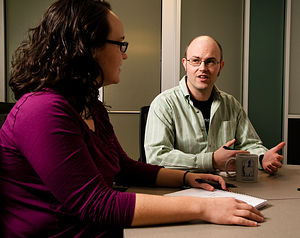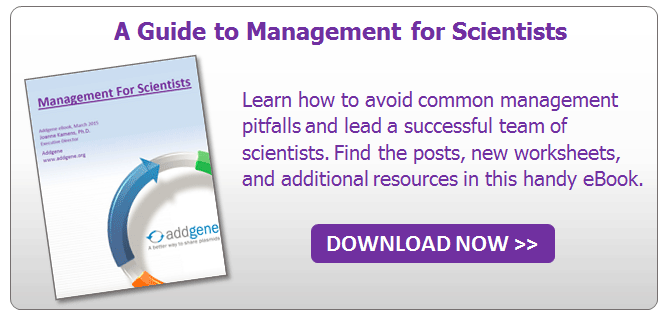 Training as a scientist in the academic system has many pluses. I delighted in my graduate school years for allowing me to focus wholly on the science I love. This immersive nature of academia often means that scientists-in-training rarely get the opportunity to learn about the myriad of diverse, nonacademic careers that will be available once they have a graduate degree in science. I find it ironic that we do all of our training as scientists (5-12 years worth!) with academic scientists who can’t help us learn about the nonacademic sphere where most of us will be working.
Training as a scientist in the academic system has many pluses. I delighted in my graduate school years for allowing me to focus wholly on the science I love. This immersive nature of academia often means that scientists-in-training rarely get the opportunity to learn about the myriad of diverse, nonacademic careers that will be available once they have a graduate degree in science. I find it ironic that we do all of our training as scientists (5-12 years worth!) with academic scientists who can’t help us learn about the nonacademic sphere where most of us will be working.
It should be no secret that one of the best things you can do during your training is meet interesting people doing interesting things. I call this building relationships because networking has gotten a bad reputation (as in…”I just hate networking”). Scientists enjoy learning new things. Building new relationships is all about learning new things from other scientists doing interesting work. Consider this to be like any other research project. You’ve met someone whose career interests you or you want to pursue someone doing a job you wish you knew more about – how do you make a connection? An Informational Interview is a great next step in your research.
What an informational interview is not
If you ask for an Informational Interview it is understood to be a nonthreatening request to discuss experience, interests and career path. Because there is no demand for a favor, the person you ask will be more likely to say yes and more open to developing a relationship. The time to develop relationships is before you need them (well really, always). Informational Interviews are for learning and for expanding your web of connections.
A mistake made by many novice networkers has a potential to alienate connections. If meeting with someone to ask about a job or a particular position at their company, do NOT call this an Informational Interview. If you do this, the connection may feel like you have misled them. It is fine to ask about specific jobs (that is what networking is about), but be upfront about interest in a job. Ask openly to be connected to someone who can help you land that position such as a direct connection to the hiring manager. They might say yes and they might say no but do not confuse networking for a job connection with ongoing relationship building through Informational Interviews.
Making Your informational interviews productive
Informational Interviews are best conducted in person. Perhaps you can offer to buy coffee or lunch at a place convenient to your interviewee? It is always best to meet in person to develop relationships, but if it is not possible consider a phone or video call. If you do decide to use Skype, make sure to follow the rules of successful, remote conversations.
In this interview you will be asking the questions, so be prepared. There are many good lists of questions on the internet. To make the most of the opportunity, use a written list and take notes if that is helpful. Keep in mind that this is a good time to ask personal questions about salary, opportunities for advancement, challenges and disappointments. These more personal questions can elicit the most valuable insights you will get from the interaction.
Most people like to help
One good place to look for interesting connections is your university’s alumni database. Sharing a school is a little connection that many people honor. Talking with strangers is usually challenging but does get easier with practice. Another perk of Informational Interviews is that it is a great way to practice for real interviews where you might spend a whole day having to talk with strangers.
Be bold in asking all kinds of people to connect with you and to share their stories. Thanks to the Benjamin Franklin Effect, most people actually enjoy helping (just ignore the people too busy to respond to you). You will uncover interesting opportunities by meeting with people working in diverse and unusual fields. My favorite final trick is to end each Informational Interview with the question, “Can you connect me to anyone else you think I should talk to?” That way you are always setting up your next opportunity to learn.
Additional Reading


Topics: Science Careers, Networking





Leave a Comment